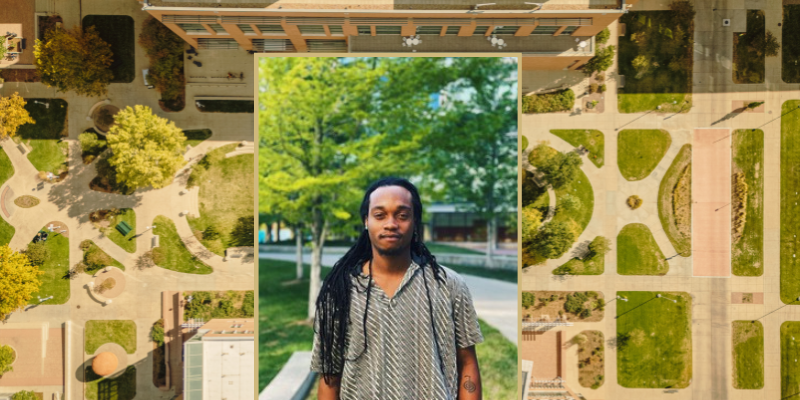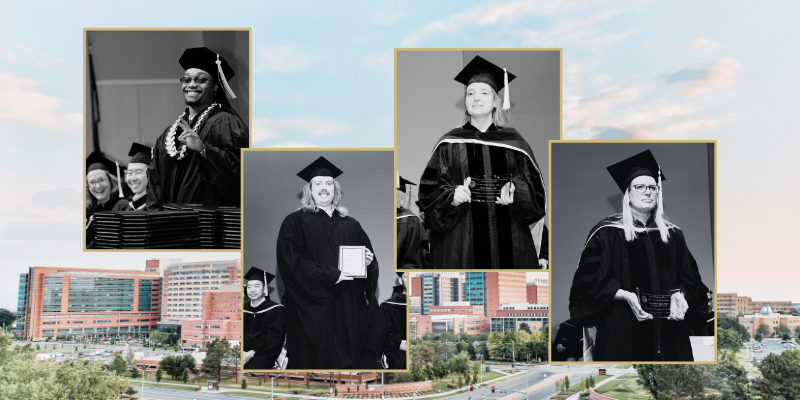Eric Stokes, PhD, successfully defended his thesis in March of this year. This marked the culmination of more than five years of work toward earning his doctorate in pharmacology from the University of Colorado Anschutz Medical Campus.
A few weeks later — with graduate school in the rearview mirror — Dr. Jason Aoto, Stokes’ thesis mentor and program director of Pharmacology and Molecular Medicine, reached out to ask if he’d heard back about the Graduate School’s 2025 Outstanding Dissertation Award. At the time, Stokes had thought Aoto had forgotten about the award entirely. On the contrary, Aoto had come together with program co-director Jim Costello, PhD, and department chair Heide Ford, PhD, to put together a nomination package that stood out to the award judges.
Each year, the Outstanding Dissertation Award is the Graduate School’s most competitive Spring Award. The committee considers accomplishments like grant funding, presentations at scientific meetings, publications, and community outreach. Stokes stood out to them as a well-rounded candidate with distinguished accolades.
“I was off campus [when I found out that I had won], but I immediately Slacked Jason. I was like, ‘Hey, we did it, we got it!’ It felt good. I was really excited, honestly,” Stokes said. “When I started grad school, I came up with a lot of imposter syndrome. Like, ‘Can I really do this?’ It feels good to actually have this as my step on the way out. Kind of like, ‘Yeah, you can do it. And you did do it.’”
His accomplishments include high-profile first author publications in The Journal of Neuroscience and Nature, earning a prestigious Gilliam Fellowship from the Howard Hughes Medical Institute, and serving as the director of a mentoring outreach program that helped local middle school students complete their own research and compete at the regional Denver Science Fair.
Stokes’ dissertation itself, Exploring the Synapse: From Molecules to Behaviors, also has important practical implications. He studied the multi-scale level of how synapses contribute to the brain, health, and disease.
The first project within his thesis involved looking at a mutation in certain proteins, neurexins, identified in a patient with epilepsy.
“I characterized what the mutation is actually doing at the synapse and how it affects interactions,” Stokes said.
The second project looked specifically at a drug that erases memory.
“I was trying to understand how it erases memory at the synaptic level, like what's happening at the synapse and how it leads to that memory erasure,” Stokes said.
As an undergraduate, he would never have imagined what he would end up studying in a lab in graduate school. He entered Morehouse College, an HBCU in Atlanta, Georgia, to study biology and go to medical school. At the last minute, he switched it up and decided to pursue research.
“I knew that I wanted to do neuroscience research that had disease relevance. I wanted to study something that had some type of connection to disease or mental health disorders,” Stokes said of what brought him to a neuropharmacology lab at CU Anschutz in the first place. “I realized that you can actually study mental health from a physiological kind of perspective.”
Outside of the lab, Stokes found time to be an active community member on campus. He said that a few things motivated him to keep adding onto his already-stacked plate.
“One, I'm the second oldest child. I'm always trying to make sure everything's good, you know. Make sure my siblings are fine, make sure the house is fine,” Stokes said. “Two, where I went to school and the way my parents are. Giving back was something that they never talked about, but I always saw them doing it. It just became innate.”
Outside of science, he tries to cater his extracurriculars to his other passions that coincide with that “giving back” mentality: mentorship and teaching. They’re things he can enjoy doing that have a positive impact and connect him to other people.
Having moved to Colorado by himself, he needed to cultivate a new community. Diving into what he’d learned from his parents and Morehouse College gave him a starting point. Over the years, he’s created an extended and interconnected network both at CU Anschutz and across the scientific community.
“Something that I dedicated my career to while I was here in grad school was to build community. I knew that I'm in this stage now, but I would need to get to another stage, or I would need to get other opportunities,” Stokes said. “I've probably done it the excessive way by making friends. You don't have to be friends with everyone, but I do think that it's important to make sure you're putting yourself out there.”
He stressed that, while important, the benefits of connections go further than professional and networking opportunities.
“You get to learn really cool things about people that you can apply to your life, or that you can incorporate down the line. It builds the understanding that I think is necessary to being scientists,” Stokes said. “People think scientists aren’t social people, and maybe a lot of us are socially awkward, but I think we should try to have these connections and community in order to make it a much more understanding environment.”
At the end of the summer, Stokes will move somewhere new and expand his community once again. His next stop will be San Diego, California, to begin a postdoc with Dr. Kay Tye at the Salk Institute for Biological Studies.

.png)
.png)
